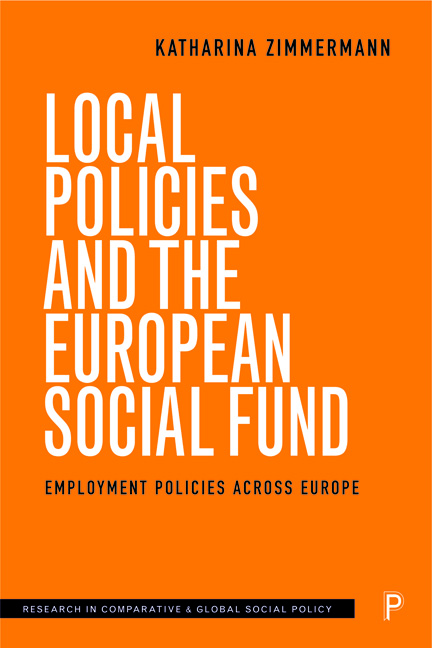Book contents
- Frontmatter
- Contents
- List of Tables and Figures
- List of Abbreviations
- Acknowledgements
- Series Preface
- 1 Introduction
- 2 Social and Employment Policies in Europe from a Multilevel Perspective
- 3 Domestic Responses to European Money: A Theoretical Perspective
- 4 The Research Programme in a Nutshell
- 5 Comparative Insights into Local Responses to the European Social Fund
- 6 What Responses Under what Conditions? Formal Qualitative Comparative Analyses and Preliminary Interpretations
- 7 Beyond Numbers: Using Case Study Insights to Support Interpretation
- 8 A Broader Perspective on Local Policies and the European Social Fund
- 9 Conclusion
- References
- Appendix: Calibration Material
- Index
8 - A Broader Perspective on Local Policies and the European Social Fund
Published online by Cambridge University Press: 04 March 2021
- Frontmatter
- Contents
- List of Tables and Figures
- List of Abbreviations
- Acknowledgements
- Series Preface
- 1 Introduction
- 2 Social and Employment Policies in Europe from a Multilevel Perspective
- 3 Domestic Responses to European Money: A Theoretical Perspective
- 4 The Research Programme in a Nutshell
- 5 Comparative Insights into Local Responses to the European Social Fund
- 6 What Responses Under what Conditions? Formal Qualitative Comparative Analyses and Preliminary Interpretations
- 7 Beyond Numbers: Using Case Study Insights to Support Interpretation
- 8 A Broader Perspective on Local Policies and the European Social Fund
- 9 Conclusion
- References
- Appendix: Calibration Material
- Index
Summary
From the beginning, this study has been interested in pathways of usage and change via the ESF in general, and not just in the 18 cases under study. Case-oriented and deterministic studies cannot simply extrapolate their findings to a larger universe of cases. Nevertheless, a certain contingent generalisation can be achieved by detaching a case's relevant characteristics and linking them to theoretical reflections. This implies a certain ‘elevation’ of particular case properties to higher levels of abstraction by means of sound theoretical reflection. This can be called typological theorising. In contrast to simple typologies, typological theories not only describe empirical clusters of characteristics, but also embed these characteristics in theoretical concepts. This makes it possible to formulate ‘contingent generalisations on how and under what conditions [independent variables] behave in specified conjunctions or configurations to produce effects on specified dependent variables’ (George and Bennett, 2005: 233).
For the present study, this means that, in order to make the findings generalisable, to a certain extent, at least, that is, to other cases in Europe in similar contextual settings, we need to do certain things. For instance, it is necessary to formulate theoretical expectations regarding how particular (conjunctions of) conditions activate the mechanisms behind usage and change in a larger universe of cases, based both on theoretical and empirical reflections. Due to this study's design and the nature of the data, it is well suited to such contingent generalisations. These are contingent in the sense that they (1) only hold for those cases in a larger population that show the same contextual characteristics as the ones that can be lifted to higher levels of theoretical abstraction, and (2) are only valid until there is no contradictory empirical evidence. In order to formulate more general statements regarding types of responses to the ESF and their contextual conditions, each pattern of response is first discussed by drawing on the respective theoretical notions and the empirical findings.
In a second step, the potential for generalising this study's findings beyond the EU is discussed on the basis of a thought experiment. By comparing the ESF to the FOCEM (Fondo para la convergencia estructural del Mercosur), the structural fund of Mercosur, I assess whether and to what extent it would be possible to find similar contextual settings and similar types of responses in Mercosur countries.
- Type
- Chapter
- Information
- Local Policies and the European Social FundEmployment Policies Across Europe, pp. 123 - 142Publisher: Bristol University PressPrint publication year: 2019



